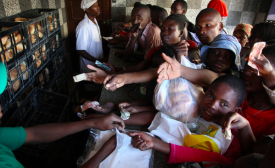development
The past two decades have been all about the BRICS: a group of five countries (Brazil, Russia, India, China, and South Africa) that soared to economic superstardom and gradually won geopolitical influence. But now, with their economies slowing down, those days seem to be over. What’s more, by some measures, the BRICS have squandered their years of plenty.
In Maputo, the “Garden for Sculptors” behind the Museu Nacional de Arte on Avenida Ho Chi Minh has become a kind of prison yard for Mozambique’s various Ozymandiases, a semi-public dumping ground where colonial monuments now crumble quietly away. A marble European baroness reclines in thick robes, the grasses growing up around her base.
Britain is to spend £1.8bn on the economic development of poor countries next year, more than double the amount spent in 2012-13, the international development secretary announced as part of a "radical shift" in policy that focuses on making it easier to do business in these states.
This Thursday (23.01), after meeting with the FIFA President Joseph Blatter, at the organisation’s headquarters in Zurich (Switzerland), President Dilma Rousseff stated that Brazil is ready to stage the “World Cup of World Cups”. During the meeting, interventions against racism and discrimination were discussed, as well as actions aimed at promoting peace and female football.
Non-governmental organizations, together with government institutions have been major stakeholders in Turkey’s African initiative. Humanitarian assistance, development aid, humanitarian diplomacy, and exchange diplomacy are central to Turkey’s existing involvement in Africa. Turkey, as the natural heir of the Ottoman Empire, has inherited both a historical baggage and a legacy in North and Sub-Saharan Africa.

Non-governmental organizations, together with government institutions have been major stakeholders in Turkey’s African initiative. Humanitarian assistance, development aid, humanitarian diplomacy, and exchange diplomacy are central to Turkey’s existing involvement in Africa.
Gender is once again on the World Economic Forum’s agenda. At this year’s Annual Meeting, a series of sessions will focus on the desirability of advancing the rights and economic power of women and girls around the world, and of continuing to close the gender gap in Western C-suites, boardrooms, parliaments and presidencies. These discussions will build on the Global Gender Gap Report 2013, published last November.
Five years ago, Central and Eastern Europe was home to one of the world’s most impressive growth stories. Annual GDP growth was close to 5%, just behind China and India. Foreign direct investment poured into Bulgaria, Croatia, the Czech Republic, Hungary, Poland, Romania, Slovakia, and Slovenia at a rate of more than $40 billion per year. One in six cars sold in greater Europe was being exported from factories in the region. Productivity and per capita GDP were rising briskly, narrowing the gap with Western Europe.







